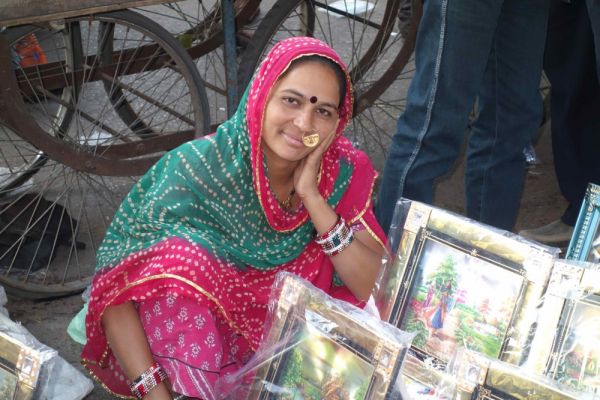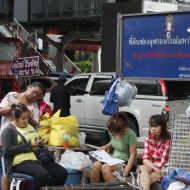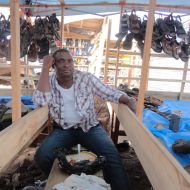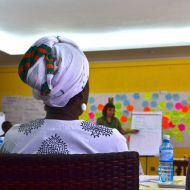Teaching India’s Informal Workers to Fight Their Legal Battles

Devi-ben at her vending spot. In January 2012, she and some 3,000 other street vendors were evicted from the historic Bhadra Fort market, which the Ahmedabad City Corporation plans to convert into a heritage plaza.
In a guest blog post, Marty Chen, International Coordinator of the WIEGO Network and a lecturer in public policy at the Harvard Kennedy School, recounts how one group in India is giving informal workers the know-how to become their own best legal advocates.
The informal economy is widely seen as the set of economic units, activities and workers that are outside the reach of government regulation. But the reality is far more complex. While some informal operators seek to evade or avoid the law, most are simply trying to earn an honest living. Many pay taxes or fees and/or have licenses or permits, but are still considered illegal. Most would be willing to register and pay taxes if they could be assured of legal protection and government support, because as it stands they are often subject to criminal prosecution or punitive actions by government and police.
To examine the legal framework and system through the lived reality of informal workers, the Self-Employed Women’s Association (SEWA) of India, the global network WIEGO, and two human rights lawyers at Harvard University organized an Exposure Dialogue in Ahmedabad City, India in late January 2013. During a two-day exposure, the participants lived with and worked alongside a local host and her family. The Exposure was followed by a half-day of Reflections by the exposure hosts and guests, and a two-day Technical Dialogue on law and informality. A total of 19 international participants (judges, lawyers, legal scholars and activists from seven countries) joined 19 SEWA organizers and eight SEWA members for the Exposure Dialogue. The SEWA members, all street vendors or waste pickers, each hosted two to three international participants. The Additional Solicitor General of India and a professor of law from Delhi University led the discussions on the first day of the Technical Dialogue.
During the Exposure, I was the guest of Devi-ben, a street vendor, together with Michael Piore of the Massachusetts Institute of Technology. Over the past several years, Devi-ben has been evicted from both her home and her place of work. From Devi-ben and her street-vendor friends, as well as from the SEWA lawyers and organizers, we learned that street vendors are often arrested or issued warrants, without due procedure or any knowledge of their legal rights. They also suffer harassment, have to pay bribes and fees, have their goods confiscated, and are evicted on a regular basis. After being beaten by the police some years ago, Devi-ben’s husband gave up street vending in the Bhadra Fort market, an historic market near the old walled city, to become an itinerant hawker in the new city of Ahmedabad.
In Ahmedabad and other cities of India, the police can justify arresting, evicting, or otherwise penalizing street vendors on the basis of several national laws: The 1860 Indian Penal Code, the 1973 Criminal Procedure Code and the 1988 Motor Vehicle Act. Moreover, municipal governments are empowered by municipal corporation acts and urban planning laws to impose fines and warrants on street vendors for causing an obstruction or not having a license. And yet most cities have not issued new licenses for many years.
The situation for street vendors is only getting worse under the recent major urban renewal and urban infrastructure schemes in cities across India. In Ahmedabad, many of the nearly 180 natural markets in the city have been demolished – or are under threat of demolition – due to a new bus rapid transit system a riverfront development project, a Model Roads scheme and various historical preservation schemes. Each demolition involves the eviction of hundreds of street vendors – often without plans for where to relocate them. In January 2012, Devi-ben and some 3,000 other street vendors were evicted from the historic Bhadra Fort market, which the Ahmedabad City Corporation plans to convert into a heritage plaza. SEWA’s legal team is involved in multiple negotiations and legal actions in support of street vendors around the city, not just in the Bhadra Fort area.
The beauty and spirit of Devi-ben, in the face of great disadvantage and discrimination, is my most vivid and lingering impression from the Exposure. My other main impression is the meaning of SEWA in her life. During the Reflections, when SEWA members were asked what law means to them, Devi-ben asserted: “SEWA is the law.” It was SEWA who intervened on behalf of Devi-ben and her fellow vendors when they were evicted from the historic Bhadra Market and negotiated that they should be allowed to vend around the original market area that was cordoned off to build a heritage plaza. And it was SEWA who negotiated that part of the cordoned off area should be re-opened for the two months before the Diwali festival of lights in 2012 to let women vendors sell Diwali goods in what SEWA called a “Ladies Market.” Devi-ben reported that the Diwali sales at the Ladies Market were so good that she and her friends celebrated Diwali with special food and gifts last year.
On the last day of the Exposure Dialogue, the participants proposed a number of strategies to sensitize local government and legal authorities to the contributions informal workers make to the economy and society, the hardships they face in trying to earn an honest living, and their rights to human dignity and to earn their livelihoods. They also proposed a number of strategies to empower informal workers, including training on their legal rights and capacity building to engage in informed policy advocacy and legal negotiations. In so doing, they acknowledged and commended SEWA on its legal strategies and the legal empowerment of its members. SEWA has been issuing ID cards to its members to give them a legal identity, providing legal literacy training to members, training selected members to be paralegals, engaging and mobilizing its members in framing joint legal demands, and engaging in collective legal struggles and negotiations. It was clear from the Exposure Dialogue that countless SEWA members, including Devi-ben, have been empowered to know and fight for their legal rights.









